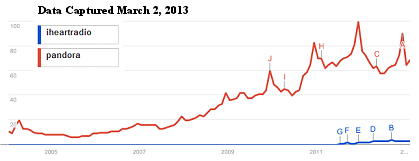| Tuesday, March 5, 2013 |  |
 |
 |
 |
 |
 |
 
 
 |
 |


 A New Breed of Indie Artists
A New Breed of Indie Artists Free Music and Programs for Radio and Podasters
Free Music and Programs for Radio and PodastersSolid Future for Internet Radio Industry II
|
For anyone creating radio online, there are reasons to push harder. They include the broadcast radio industry giving you a wide open future, and the days of diminished advertiser support soon disappearing. This is the second of a two-part description of the "why" and "how" behind this assessment. (Part 1 Here) |
"Mr. Koenigsberg, literally, gave a road map to the answer: 'I think return of investment proof and engagement proof is critical.' It has not been followed by radio." |
View these three pictures of New York City (click each to expand). They represent the transition from horse and buggy to automobile, a time when blacksmiths and buggy whip manufacturers failed to adjust. This is what the broadcast radio industry is facing today. A difference is that radio continues to push out words that it's maintaining the relevancy of days gone by, a strategy tried by Kodak with film cameras.
 1900 |
 1910 |
 1920 |
Internet radio should not fear the claimed reach of broadcast radio, as it is similar to the situation depicted of horses and buggies in the 1910 New York City photo above.
The radio industry is still being heard, just like buggies were still being used in 1910. But, by 2020, will the broadcast radio industry continue at the same strength or end up mired in a metaphorical digital cavalcade, as represented by autos in the 1920s photo? With its pencil-pusher leaders dismantling all that made radio locally relevant through job cuts, you be the judge.
Part of the reason automobiles proliferated was that they got the horse sh*t off the streets. Think of what comes out of your local station today. It's not hard to see another metaphor.
With so many broadcasters simply repurposing their programming to a stream, we need to ask whether people are going online to listen to what's found over the air. The Google Trends' graph may help clarify demand. Even with the power of Clear Channel's 800+ radio stations promoting iHeartRadio, along with approximately another 800 stations outside of CC, the masses appear to be seeking "different."

My words will be cast aside by broadcasters, an action that has no effect on my life anymore. For 16 years I wrote and warned, pleaded and pointed, and had meetings with those at the very top to explain why radio needed to pay attention to digital. But they all kept repeating the mantra, "Radio reaches 93% of America each week." (A ratio that's eerily similar to the picture above from 1910.)
Therein is the radio industry's main problem, to rely too much on anything that it can paint as a positive. Another example comes from these headlines. They ran on 3 radio publications yesterday (nearly all trades carried similar words):

 Radio Execs Optimistic About Future of Industry
Radio Execs Optimistic About Future of Industry
 Survey: The sky’s blue for most in radio.
Survey: The sky’s blue for most in radio.
 Kassof Study: Radio Execs Optimistic About Industry's Future
Kassof Study: Radio Execs Optimistic About Industry's FutureYou might think the above observations are from extensive research but it was 104 owners, group executives and general managers who responded to this "survey" - with the story's main theme boasting "69 percent report themselves optimistic." My bet is that every one of those persons would laugh if you tried to convince them to purchase a product or service using results from a survey of only 104 respondents.
For now, focus on this February 18, 2013 Advertising Age quote from Keith Reinhard, chairman emeritus of DDB Worldwide (a top advertising firm). He's speaking of where the radio industry sits in importance to advertisers in an explanation of why music isn't such a central part of advertising today: "Is it because of shorter commercial lengths or the lesser importance of radio in launching and sustaining an advertising campaign?"
Let's leave with a series of quotes from Radio Ink Magazine, a leading industry publication that vacillates between pushing radio forward (for which I give great respect) and providing excuses for radio's lack of forward movement. For all who are in internet radio today, this passage from Radio Ink, posted on January 2012, is possibly the biggest reason your future is solid: "Bill Koenigsberg is the President, CEO and Founder of Horizon Media, one of the largest independent media agencies in the world."
Radio Ink continues: "For what seems like decades, radio has only been able to muster up about 7% of an advertiser's budget. So we asked Koenigsberg what it was going to take for radio to increase that number."
Mr. Koenigsberg, literally, gave a road map to the answer: "I think return of investment proof and engagement proof is critical." It has not been followed by radio. But that's not important now. What you need to read are the comments made by those in the radio industry following his answer. These are typical:
1) "No need to reinvent the wheel. Everything that you need to know about radio success is available by studying what was successful in the past." 2) "But radio is intrusive! It's the advertisers who need to reinvent themselves...." |
For internet radio operators, your future is going to be one of challenge - but it won't come from broadcasters. Internet radio holds potential to supply all of the elements that advertisers want and that terrestrial radio has ignored. Implementing these will be the hurdles online radio faces, and they are high hurdles (to be discussed here soon).
As an internet radio operator all you need do is be prepared, and wait. When new dashboards become common in cars, radio, as the radio industry paints its picture, will cease to exist. Those who embrace accountability in advertising and programming will simply step in to fill its void. Like electronic invoicing, proof of ROI is what has been asked of, and ignored by, the radio industry since the turn of this century.
The change that's coming will be similar to those horses finally getting out of the way, with automobiles - in those pictures above - analogous to digitally-delivered audio programs.
Tomorrow's successful internet stations will be run by people who understand broadcast-style radio is dead.
Long live radio online.
While the broadcast side of radio has a near lockout on indie artists, introducing music is open wide to internet stations.
| A Spiritual Music artist to consider: Skylar Kaylyn. |
 sample song |
Skylar Kaylyn Download Song
|
Give Skylar Kaylyn's "Happy Ever After" a listen.
Add it to your playlist, free! Such is the new world of music distribution.
The radio industry had its shot. It's time internet radio programmers take a chance and reach into a huge pile of talent. It is there that new hit songs will increasingly be found.
More Articles
 |
 |
 |
comments by Disqus |

